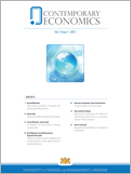The Prospects for Reforming the State Fiscal Policy
The Prospects for Reforming the State Fiscal Policy
Author(s): Valentynа Antonenko, Leonid Katranzhy, Kostiantyn Moiseienko, Svitlana V. Yudina, Olha Brezhnyeva-Yermolenko, Svitlana M. Hanziuk, Aistė Galnaitytė, Virginia NamiotkoSubject(s): Supranational / Global Economy, Economic development, Public Finances, Fiscal Politics / Budgeting
Published by: Akademia Ekonomiczno-Humanistyczna w Warszawie
Keywords: State taxation policy; tax evasion; progressive taxation; fairness in taxation; tax administration;
Summary/Abstract: Currently, developing the tax system and improving financial relations between the state and taxpayers are rather important aspects of reforming the economic situation and are relevant to this study. The purpose of this article is to substantiate the scientific approaches to the reform of modern tax systems and to identify effective directions for their practical implementation. This study focuses on an analysis of the history and the current state of the tax system in Ukraine, the identification of existing deficiencies in the Ukrainian tax system, a comparative analysis of the foreign tax systems, and an evaluation of the tax experience of developed countries in the context of its implementation in Ukrainian economic reality. This study is based on the following current scientific conceptions and methods: fiscal methods to defend the state’s interests; theory, methodology and practice of budget-forming tax use, in particular, various types of tax rates (proportional, progressive, and regressive); constructive-critical analysis of tax policy development and the ways to reform it; and theoretical approaches to the definition of tax administration and directions for reforming and improving its efficiency. The following research results have been substantiated and proposed for implementation: the use of preventive taxation aimed to avoid tax evasion and to provide effective protection of the fiscal interests of the state; the reform of the corporate income tax by transition from a proportional rate to a regressive rate; the abandonment of the proportional rate and the use of a less harsh progressive rate of the personal income tax; the shift in priority in tax control from planned continuous tax audits to tax investigations; and the introduction of direct methods for determining tax liabilities into tax administration practice.
Journal: Contemporary Economics
- Issue Year: 13/2019
- Issue No: 4
- Page Range: 388-406
- Page Count: 19
- Language: English

